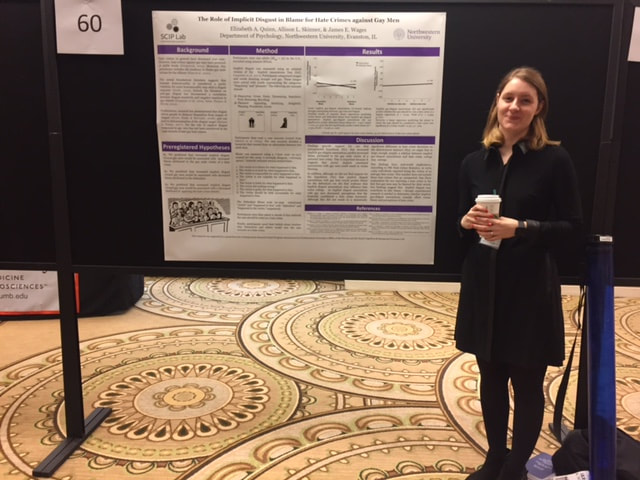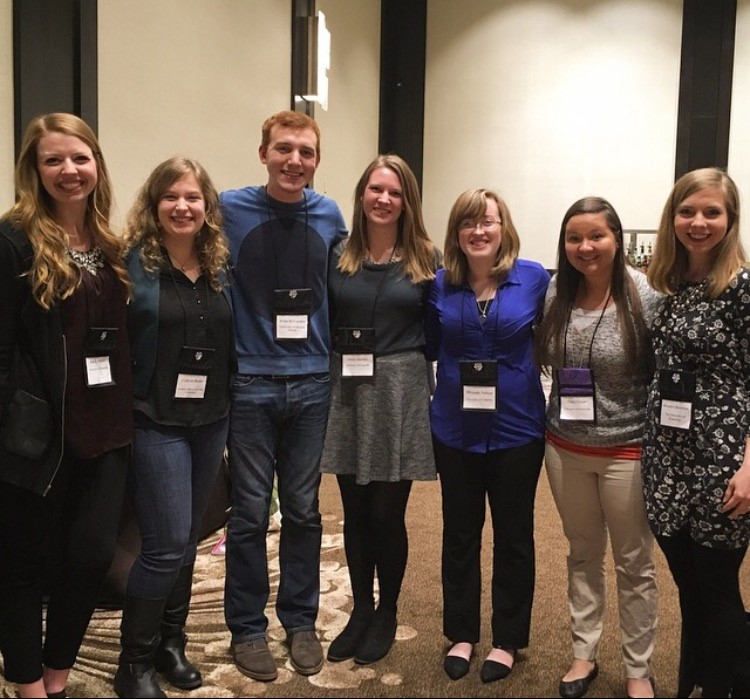|
Elizabeth Quinn is a senior at Northwestern University getting her undergraduate degree in Psychology! She presented her research (The Role of Implicit Disgust in Hate Crimes Against Gay Men) at the 2018 Midwestern Psychological Association Conference in Chicago, IL and the 2018 Society for Personality and Social Psychology's annual conference in Atlanta, GA! Congratulations Elizabeth, keep up the great work!!
The Role of Implicit Disgust in Hate Crimes against Gay Men In hate crimes committed against gay men, victims are often blamed for provoking the violence. This argument is the cornerstone of the infamous “gay panic defense,” which legally legitimizes this behavior in 48 American states. Until now, the role of implicit disgust has yet to be explored in blame decision-making. In the current preregistered study, we examined the association between implicit disgust and blame decision-making in hate crimes against gay men. Participants (N = 252) completed a version of the Implicit Association Test adapted to assess implicit disgust and then read a case scenario detailing a homicide that ensued from an altercation between two adult men. Next, participants completed scales of blame attributed to the victim and indicated the extent to which they believed the case should be ruled as a hate crime. Results indicated that increased implicit gay-disgust associations were associated with increased blame attributed to the victim. Although implicit disgust was unrelated to defendant blame, individual levels of implicit disgust were associated with perceptions that the hate crime statute should be applied. As implicit disgust associations with gay men increased, perceptions that the homicide constituted as a hate crime decreased. The current findings suggest that implicit disgust may contribute to victim blaming in hate crimes against gay men; however, experimental evidence is needed to determine whether implicit disgust causally influences victim blaming and perceptions of hate crimes.
0 Comments
Emily is a first-year student at Indiana University, pursuing a PhD in School Psychology. She presented her research at the annual meeting of the AP-LS in Seattle, WA in 2017. Congratulations, Emily! The Role of Compassion Fatigue and Years of Experience in Child Custody Decisions Abstract: Compassion fatigue is defined as a worker’s diminished ability to empathize with clients (Adams, Figley, & Boscarino, 2008). It is common among “helping workers” and can result in psychological detachment from clients as a coping mechanism (Dane, 2000). In the present study, we explored the relationship between social workers’ compassion fatigue and years of job experience on child custody case judgements. Participants read a vignette depicting a mother who had lost custody of her son due to neglect allegations, but was attempting to regain custody. Supporting hypotheses, as compassion fatigue increased, recommendations that the mother receive custody increased. Additionally, increased compassion fatigue was associated with increased beliefs that reunification was not in the child’s best interest (e.g. the child would have no potential if reunited with the mother) and was simultaneously associated with increased beliefs that the mother was a good parent (e.g. the mother was of high character). As years of job experience increased, recommendations that the mother receive custody increased. Increased years of experience was also associated with increased beliefs that the mother was a good parent (e.g. the mother has recovered from her addictions) and was simultaneously associated with increased beliefs that reunification was not in the child’s best interest (e.g. the child would have no potential if reunited with the mother). The effect of years of experience on custody rulings was mediated by compassion fatigue. This study provides strong evidence that compassion fatigue leads to client detachment, disengaging, and work-related pessimism. |
About the Editor:
The American Psychology-Law Society (Division 41 of the American Psychology Association) Student Committee is composed of elected student leaders representing the interests of our student members. Categories
All
Archives
June 2024
|
|
Except where otherwise noted, content on this site is licensed under a Creative Commons Attribution 4.0 International license. Icons by Icons8
|
|



 RSS Feed
RSS Feed
